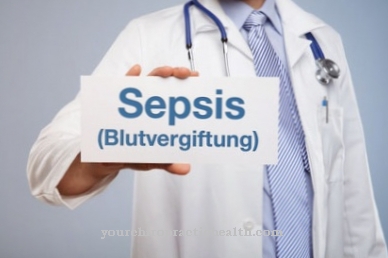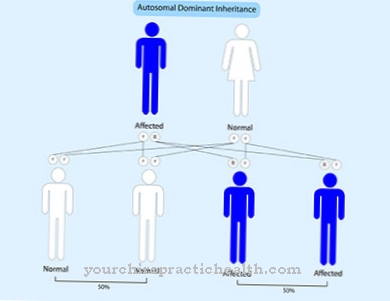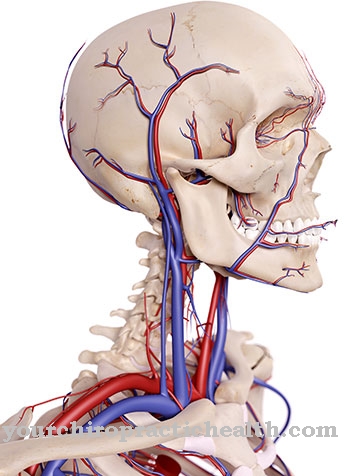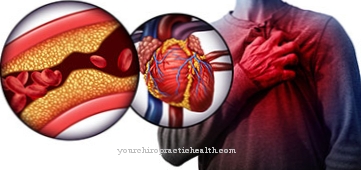Under Hypersomnia the doctor understands that Addiction to sleep. Sleep addiction manifests itself in an excessive need for daytime sleep, which can manifest itself in very different ways. It mainly affects middle-aged men. Usually hypersomnia occurs in connection with other, mostly mental illnesses or with pronounced sleep apnea.
What is hypersomnia?

© Syda Productions - stock.adobe.com
The Hypersomnia manifests itself in an increased need for sleep during the day without frequent or long-lasting, consciously perceived wakefulness phases during night sleep.
The daytime sleep can express itself very differently and ranges from short sleep attacks, which afflict the person affected like an attack, to permanent fatigue throughout the day. Those affected suffer greatly from the clinical picture, as the performance is impaired. Participation in road traffic, for example, is usually no longer possible.
Hypersomnia is divided into mild, moderate and severe hypersomnia based on its severity. In mild hypersomnia, involuntary sleep does not occur every day, in moderate hypersomnia daily and in severe hypersomnia several times a day.
causes
The causes of the Addiction to sleep are not yet clearly known. What is striking, however, is the frequent simultaneous occurrence of other diseases, such as depression, schizophrenia, cancer, Parkinson's or multiple sclerosis.
An association between drug and alcohol abuse and insomnia has also been observed. The most common cause - as various sleep laboratory records have shown - is sleep apnea. If a patient suffers from sleep apnea, breathing often stops during night sleep. This can happen several times an hour and last for minutes.
The suspension of breathing leads to a lack of oxygen in the body. Sleep at night is then not very relaxing without the person concerned noticing it. The constant wake-up situation also causes enormous stress.
Symptoms, ailments & signs
The central symptom of hypersomnia is daytime sleepiness. The tiredness during the day is very pronounced and does not occur once, but regularly or permanently. Those affected often find it difficult or impossible to keep awake.
In addition, difficulty concentrating can be an indication of hypersomnia. As a result, job performance may decrease and the likelihood of errors increases. The lack of concentration and tiredness can also be expressed in motor insecurity.
Another possible symptom of hypersomnia is memory problems. Some of these are related to the difficulty concentrating. Depending on the underlying disease of the hypersomnia, sleep can be perceived as restful or unrefreshing. Narcoleptics typically feel refreshed during the day after a short sleep, while other forms of hypersomnia may not.
Daytime sleepiness often affects drivers' ability to drive. Depending on the type of hypersomnia, the spectrum ranges from general inattention and a lack of concentration to narcoleptic sleep attacks. Even with hypersomnias other than narcolepsy, drivers can fall asleep.
They fall asleep at the wheel for a few seconds, sometimes without even realizing it. Furthermore, psychological symptoms such as [Depressed mood depressive mood]] can occur. Conversely, hypersomnia can also result from depression, schizophrenia, or other mental illness.
Diagnosis & course
In order to be able to make a reliable diagnosis, a stay in a sleep laboratory is advisable. The patient's night sleep is monitored in a sleep laboratory. For this purpose, it is connected to the EEG and EKG, which enables the monitoring of brain waves and cardiac activity.
Movement activity and breathing flow are also recorded. The patient also receives a number of questionnaires and is subjected to various tests - e.g. the pupil size is measured during the night or the ability to concentrate during monotonous activities - which also provide information about his night and day sleep. If all results are available, an experienced sleep specialist can diagnose "hypersomnia".
If an organic cause comes into consideration, the tests in the sleep laboratory are followed by an internal or psychiatric diagnosis. The course of hypersomnia varies greatly. In the case of mild hypersomnia, the patient usually does not suffer from drowsiness, and often does not even perceive it as an illness.
Only when the individual daily rhythm of the person concerned is disturbed or secondary diseases - such as cardiovascular problems - have occurred due to disturbed sleep at night, the person concerned will perceive the disease.
Complications
In most cases, hypersomnia occurs in middle-aged men. Those affected suffer from a downright addiction to sleep. If a high need for sleep is not met on a daily basis, the patient will feel ill or become more irritable. Hypersomnia also has a negative effect on the patient's psyche and is usually also associated with other psychological complaints.
The patient's sleep is very deep and lasts a long time. Getting up is often difficult. It is not uncommon for those affected to suffer from sleep disorders and therefore need sleep at other irregular times. Everyday life is disrupted by hypersomnia and made more difficult for the patient. In many cases it is no longer possible to do a job or a normal activity.
Furthermore, there can also be complaints to the heart or to the patient's circulation, which in the worst case can lead to death. Treatment of hypersomnia is usually causal and does not lead to any particular complications. However, it cannot be predicted how easily the underlying disease can be treated. In most cases, however, life expectancy is not reduced.
When should you go to the doctor?
In phases of higher physical or emotional demands, an increased need for sleep is quite natural. A visit to the doctor is not necessary in these cases, as normally normal sleep behavior automatically sets in after successfully coping with the situation. As long as the need for sleep does not exceed nine to ten hours a day, there is no cause for concern. A doctor's visit is necessary if the need for sleep increases or if it occurs without a comprehensible reason.
If the person concerned feels exhausted and tired even from performing light tasks despite getting enough night's sleep, a doctor should be consulted. If the sleep problems persist for several months, a visit to the doctor is also recommended. If you have a sudden attack of sleep, this is considered unusual. If the performance of everyday or professional tasks is interrupted by falling asleep unexpectedly, the person concerned needs help.
If the person concerned is dazed, shows a depressed mood, if he suffers from constant attention deficits or if he is only vaguely aware of environmental influences, a doctor must be consulted. If breathing disorders occur, sleep interruptions occur more frequently or the person concerned never feels really fit despite good sleep hygiene, check-ups are advisable. In addition to a nutritional deficiency, results from a sleep laboratory can help pinpoint the cause.
Doctors & therapists in your area
Treatment & Therapy
Since the Addiction to sleep usually the result of another disease, the cause must be treated. Sleep apnea, one of the most common causes of hypersomnia, is usually triggered by being overweight or narrowing the airways.
If this is the cause of the sleep addiction, it usually helps to lose weight or to correct or expand the airways surgically. It can also help the person concerned to wear a breathing mask while sleeping at night, which supports breathing and thus prevents breathing ceases.
In extremely rare cases in the presence of severe hypersomnia, drugs can be given. The drugs - all amphetamines - can overcome sleep addiction, but they are extremely addictive. We strongly advise against self-medication.
You can find your medication here
➔ Medication for sleep disordersOutlook & forecast
The prognosis of hypersomnia is tied to the cause and the overall diagnosis of the patient. If the person concerned suffers from a mental disorder such as fear, obsession, depression or an addiction, there is a risk of a chronic course of the disease. Symptoms are usually only relieved when the mental illness is treated and there is an improvement in emotional stability.
In the case of cancer, the triggering tumor needs to heal so that the hypersomnia is reduced or completely regressed. Recovery often only occurs after several years of therapy and is accompanied by phases of relapse. If the patient suffers from a chronic or progressive disease such as Parkinson's or multiple sclerosis, the prospect of a cure for the hypersomnia is slim. As the underlying disease progresses, the accompanying symptoms manifest. In severe cases, the patient is threatened with an increase in symptoms.
If the hypersomnia is triggered due to existing living and accompanying circumstances, a change in everyday processes or environmental influences can lead to the patient being free of symptoms. Sleep hygiene needs to be revised and optimized in these situations. Often an adjustment of the daily routine to the human needs as well as a changed mental attitude to the everyday challenges is necessary so that an alleviation of the sleep problems can occur.
prevention
One Hypersomnia itself cannot be pretended. Since it is usually the result of another illness - often sleep apnea due to obesity - it is advisable to keep your body weight low. Refraining from excessive alcohol consumption is just as helpful as consistently avoiding drugs and eating a healthy diet.
Aftercare
For patients with hypersomnia, it is particularly important to ensure that the sleep hygiene rules are observed in the follow-up care. Above all, this includes a controlled course of the day-night rhythm in connection with the observance of the sleep-wake rhythm. Sleep deprivation and sleep deprivation are to be avoided. The sleep-wake rhythm has to be tailored to the individual patient and adjusted.
In this way, optimal sleep and wake phases can be firmly established in the 24-hour daily routine. Sleep phases during the daytime phase should be exceptions and also be coordinated with the behavior and habits of the patient. A sleep-wake or fatigue-wake diary is recommended. This makes it easier for the patient to integrate his activities into the daily routines in a meaningful and effective manner.
Activities and chores that are part of the routine can then, for example, be shifted to the phases of daytime sleepiness. A healthy lifestyle is also extremely important for patients with hypersomnia. Alcohol should be absolutely avoided due to its tiring effects. A rather light, low-carbohydrate diet over several small meals during the day makes sense.
Aftercare also includes informing the immediate family members but also the social environment. The patient's further life planning, for example with regard to training, retraining or occupation, also plays a decisive role in living with hypersomnia.
You can do that yourself
If there is a strong need for sleep, the person affected should take various precautions to avoid complications or an increased risk of accidents. The need for sleep reduces the usual performance and leads to a reduction in participation in social life. In order to reduce conflicts in professional and social life, people in the immediate vicinity should be informed about the problems.
The symptoms of the disease are often due to increased stress and dissatisfaction. The general lifestyle should be reviewed and optimized. The intake of food should be improved and should be rich in vitamins and fiber. Obesity should be avoided and sufficient exercise or sporting activities promote general well-being. Do not consume alcohol or nicotine. Stimulants in the form of drugs or excessive drug use should also be avoided.
Sleep hygiene must be changed according to the needs of the person concerned. A visit to the sleep laboratory is helpful and very informative. Sources of interference during the rest and recovery phases must be eliminated. If possible, the daily routine should be well structured and set up regularly. If sudden attacks of sleep occur, sources of danger must be eliminated. Participation in road traffic should not take place without an accompanying person. Activities that pose a high risk of injury are also not to be carried out without supervision and protective clothing.













.jpg)

.jpg)
.jpg)











.jpg)